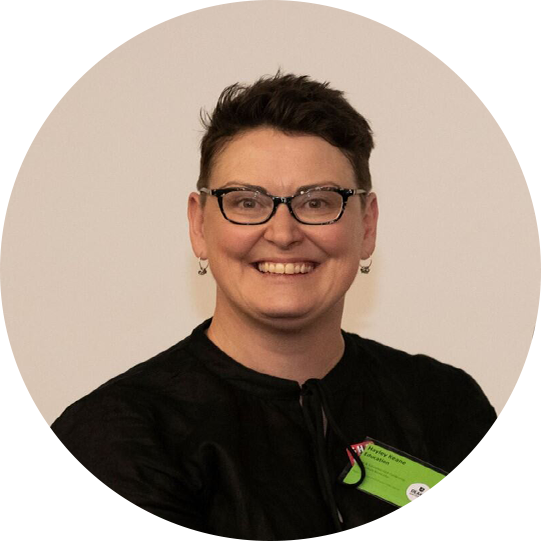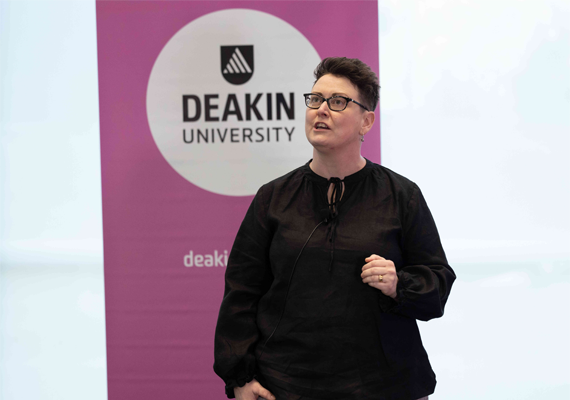
'…[Deakin’s] Warrnambool campus is such a welcoming place. Everyone is keen to help you succeed in your studies and will support you however they can.'
Hayley Keane
PhD candidate, adult and continuing education and teaching
Meet Hayley Keane, PhD candidate based on Deakin University’s Warrnambool campus and finalist in this year’s Three Minute Thesis (3MT®) and Visualise Your Thesis (VYT) competitions.
Hayley’s research seeks to understand how people in low technology roles learn at work and also how they use digital technology every day.
Hear what inspired Hayley to do her PhD, participate in both 3MT and VYT competitions, and the advice she has for people who may be thinking of taking on a PhD while working and raising a family.

'…[Deakin’s] Warrnambool campus is such a welcoming place. Everyone is keen to help you succeed in your studies and will support you however they can.'
Hayley Keane
PhD candidate, adult and continuing education and teaching
Tell us about your PhD project.
My research looks at learning, digital literacy and safety training with workers in low technology roles. In my case study these are workers in catering, linen and environmental (cleaner/orderly) services in public hospitals.
Understanding how low technology workers learn at work and how they use digital literacy every day may improve the way organisations design, develop and deliver safety training, so that it more closely aligns with the learning and digital technology used every day. Ultimately, improving comprehension of safety training therefore improves safety at work.
What inspired you to do a PhD?
I found this problem in my own workplace. I’m the educator for catering, linen and environmental services in a public hospital in regional Victoria and part of the role was to improve the digital literacy of these workers. But it seemed like they had no agency for this as they couldn’t see how it would benefit them at work or at home. The only benefit was so they could use a computer to do their yearly safety training.
I discussed my problem in practice with Associate Professor Lynch who suggested the Graduate Certificate of Education Research as a starting point.
Once I completed the Grad Cert – which is a mixture of coursework and a research paper – I realised there was more I wanted and needed to know to solve my problem and so I continued into a PhD. It also helped that I was loving most parts of the research journey by this point and really wanted to continue on.
I was lucky enough to be offered a scholarship as a full time PhD candidate based at the Warrnambool campus which helped balance the few hours that I work now.
My supervisors – Assoc. Prof. Lynch and Dr Ollis – are brilliant! They are based at the Warrnambool and Waurn Ponds campuses respectively.
How is your PhD research making an impact?
As most research, it’s a slow burn. The impact already in my own workplace is that these workers are talking about how safety training could be better designed to meet their needs. They know that it’s totally okay if they don’t want to improve their digital literacy but is also okay if they do want to.
I’ve just received Human Research Ethics Committee approval to start collecting data at two public hospitals in regional Victoria; South West Healthcare in Warrnambool and Colac Area Health. Once I have some data, I think the potential impact will become clearer. My goal is to use the data to inform the design and development of new ways of delivering safety training. But whatever this looks like, it must be with the workers, and not for them.
Where do you hope your PhD will take you in the future?
I want to fix the problem! After that, who knows. Any and all suggestions welcome.
South-west Victoria is home to me, so I will be staying right here in Warrnambool!
Three words to describe your PhD research?
With those impacted.
What is your favourite thing about studying on Deakin’s Warrnambool campus?
The Warrnambool campus is such a welcoming place. Everyone is keen to help you succeed in your studies and will support you however they can. I got to share my 3MT presentation with other PhD candidates and academic staff and receive feedback that really helped me to improve.
Additionally, the Warrnambool library team are very supportive and with online learning I feel part of the wider Deakin network.
Warrnambool really is the best place to live, study and work.
Why did you choose to participate in the 3MT/VYT program?
A PhD for me is a journey. In my undergraduate degree, I worked full time and studied part time, was a Cloud-based student and therefore didn’t, for many reasons, participate in extra-curricular activities. The 3MT and VYT competitions, for me, were part of my PhD journey or experience that I wanted to make sure I tried. To put my research, and myself, in front of other students and staff and see how I and it stood up.
A PhD can be a long and lonely road and pushing myself to step outside of my little office is important, now and for my future career planning. Maybe it’s even about networking for my future career or to hear what else is happening in the way of research.

How did you come to prepare for both competitions? What’s similar and what’s different?
I started by attending the Deakin Graduate Research Academy’s online training program in which both 3MT and VYT were discussed. I knew I wanted to try 3MT, but it was only when discussing with my family that my 14-year-old daughter said she could help me with the VYT presentation. I’m not sure if you’ve heard of ‘see one, do one, teach one’ as a training method, but this seemed as good a time as any to get her to teach me Pro Create and Cap Cut. So I worked on both simultaneously.
While it was never the intention, it worked out that I submitted both in the same year. It also helped that my ethics was dragging on, I was feeling disengaged and needed something fun to do to get my spark back. 3MT and VYT definitely did that for me.
Both programs were similar in that they required me to develop short, succinct and impactful scripts of my research that were suitable for an intelligent but not expert audience. Where 3MT challenged me to memorise and then present as if it was natural, VYT forced me to think of ways to demonstrate visually and then work out how to make the program do what I wanted it to do.
What advice do you have for people who may be thinking of taking on a PhD while working and raising a family?
It’s tough, but it actually fits pretty well with work and family. I work a little, study during school hours or early morning, discuss my research with the children and my husband. My daughter actually attended my confirmation and now refers to it as ‘our confirmation’!
My dogs also love having me home during the day. They’re great for emotional support and bouncing ideas off, although most of their answers are ‘scratch me whilst I mull that over’.
Keep focussing on why you started and remember that if it was easy, everyone would be doing it.
But seek out a scholarship or financial support if you need to and remember that it’s ok to ask for help.
Come to the Warrnambool campus to study, it’s the best.
What's the first thing you'll do after you submit your PhD?
Book a holiday in the bush near a river with a fire burning and books to read.
Re-imagine your career, connect with industry and make your impact alongside world-leading researchers in one of Australia’s leading research communities.
For more information about any of our researchers please contact Deakin Research.